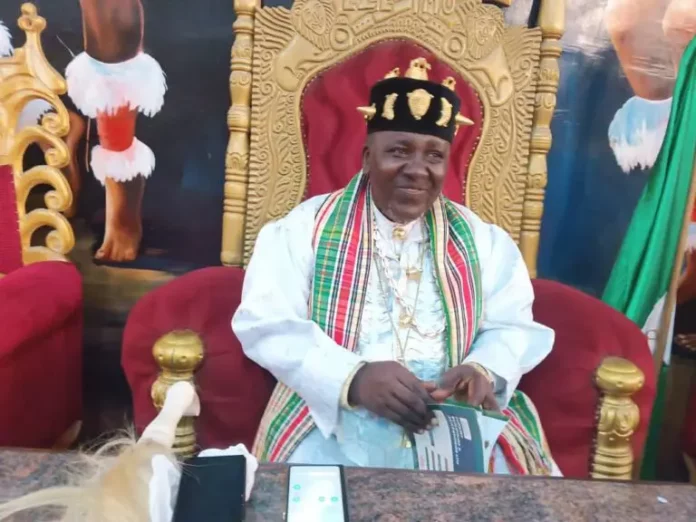The ban on all cultural festivities in Igboland is still in effect, as the region continues to mourn the loss of its prominent sons and daughters.
Eze E.C. Okeke, the Chairman of the Southeast Council of Traditional Rulers and traditional ruler of Amaifeke Ancient Royalty, reaffirmed the mourning period during a press statement on Tuesday.
The ban, which has affected all cultural celebrations, including the Igbo New Yam Festival, was declared in response to the recent deaths of significant Igbo figures.
“We are still in mourning over the loss of our great leaders,” Eze Okeke stated.
The loss of Chief Emmanuel Iwuanyanwu, Ifeanyi Ubah, Ogbonnaya Onu, and Onyeka Onwenu has deeply shaken the Igbo community.
The decision to keep the cultural festivities banned was made in honor of these illustrious figures who passed away in the same year.
“It is necessary to formally inform the public, especially Heads of Igbo Associations and Organizations, that a mourning period has been declared by the Southeast Council of Traditional Rulers and Ohaneze Ndigbo,” Okeke added.
He stressed that this mourning period is not just for the families of the departed but for all of Igboland, recognizing the significant roles these leaders played in shaping the region’s cultural and political landscape.
The chairman explained that the mourning period began after these individuals were laid to rest.
In considering the gravity of the situation and the profound impact of the losses on the Igbo people, it was deemed inappropriate to proceed with any cultural celebrations.
“It would be self-ridicule and insensitivity to the Igbo people to celebrate while we are in mourning,” Okeke said.
He emphasised that continuing with such large, festive gatherings at this time would not only have been disrespectful but also out of place.
The Igbo New Yam Festival, a key cultural event, typically sees the participation of Ohaneze Ndigbo, state governments, traditional rulers, and other influential figures.
This year, however, the festival, along with other planned events, has been cancelled as part of the region’s collective mourning.
“To proceed with the festival while we mourn the loss of these great men and woman would have been a tragic misstep,” Okeke said.
The Igbo people, according to Okeke, are known for their respect for traditions, and this decision was made to uphold the dignity of the community during such a difficult time.
He warned that any individual or group attempting to break this decision would be seen as an enemy to Igbo culture.
“Anyone who violates or attempts to breach this sacred decision should be prepared to explain themselves,” Okeke cautioned.
The mourning period is also seen as a time for reflection on the contributions of the departed leaders to the growth and development of Igboland.
Okeke noted that the losses of these influential figures are not only a personal grief for their families but a collective loss for all Igbos.
The ban on celebrations reflects the deep sorrow that the region feels.
As one of Nigeria’s most vibrant and culturally rich regions, Igboland has always placed great importance on its cultural festivals.
However, the unprecedented loss of these key figures has shifted the focus of the people towards honoring their legacies.
The death of Iwuanyanwu, Ubah, Onu, and Onwenu in such quick succession has had a profound effect on the Igbo community.
Their contributions to Igbo culture, politics, and business were invaluable, and their absence is keenly felt across the region.
The decision to suspend all celebrations is a reflection of the deep respect the Igbo people have for their departed leaders and for the sanctity of their mourning period.
Eze Okeke also highlighted that this collective grief is a time for unity and reflection rather than celebration.
He called on all Igbo leaders, both in the region and abroad, to adhere to this decision.
“This is not just about the loss of individuals but about the pain we all feel as a community,” Okeke said.
As the mourning period continues, the people of Igboland are expected to come together in solidarity, honoring the memories of their fallen leaders.
The chairman concluded by stressing that Igboland’s unity during this time of sorrow is a testament to the region’s strength and resilience.
“Their legacy lives on in our hearts, and we must remember them with dignity and respect,” Okeke stated.
For now, the cultural celebrations of Igboland will remain on hold, as the region processes the loss of these towering figures.
This solemn decision has been met with understanding from the majority of the Igbo people, who recognize the importance of honoring their fallen leaders.
As Igboland continues to mourn, the call for unity, respect, and reflection remains at the forefront of the community’s collective consciousness.

